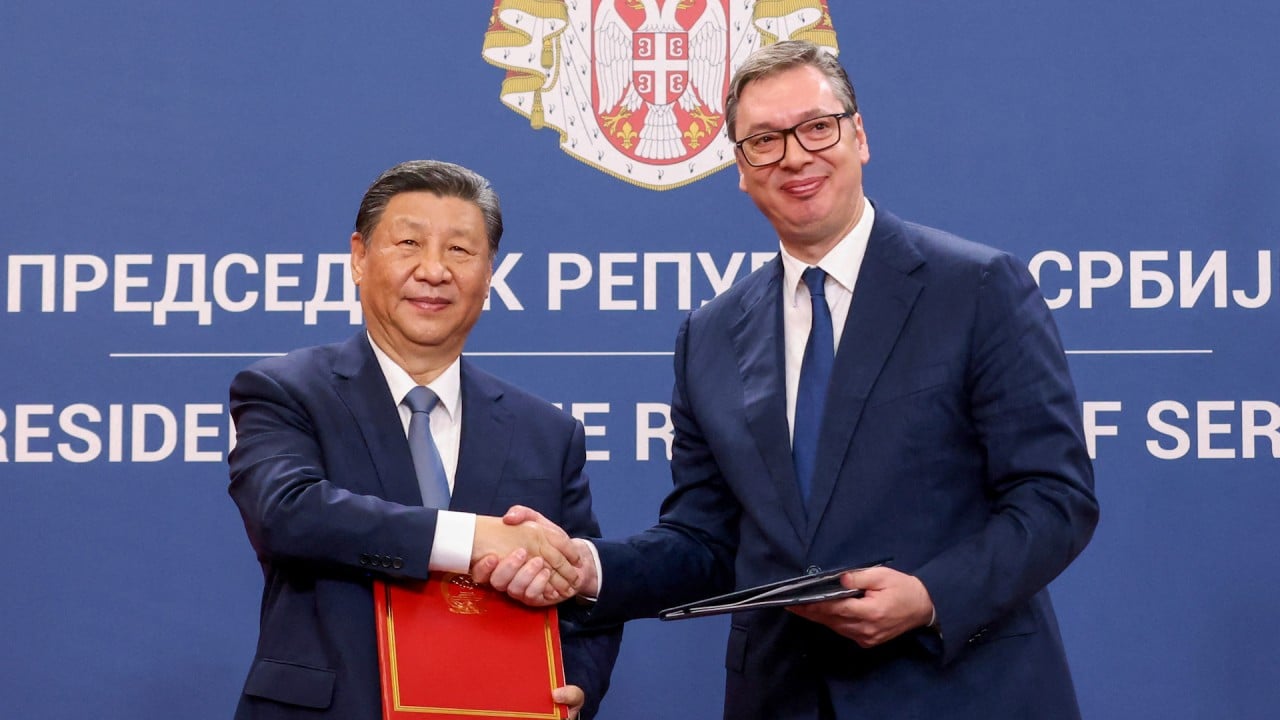Xi framed the visit as “opening a new chapter” in bilateral relations during his meeting with Vucic, as the two countries signed a pledge to deepen and elevate their comprehensive strategic partnership and announced that they would “build a community with a shared future”.
Although it did not specify military cooperation, the joint statement issued afterward said both sides promised to cooperate in fighting terrorism.
The deal to boost hi-tech industry and anti-terrorism cooperation comes as Serbia has been increasing military ties with China, notably in procuring advanced weapons systems, such as unmanned aerial vehicles (UAVs) and missile defence systems.
Serbia – the only European country operating Chinese weapons – runs a military that is based on Soviet technology. Russia is one of its main suppliers as a result of centuries-old cultural and political ties.
In 2020, Beijing delivered six Chinese-made CH-92A combat drones along with 18 FT-8C laser-guided missiles to Belgrade. Three years later, Serbia acquired Chinese CH-95 UAVs, and in February, Vucic announced that Belgrade would buy even more of the drones.
Belgrade bought China’s FK-3 surface-to-air defence system – an export variant of the HQ-22 missile system – in 2019, taking delivery in 2022.
The Chinese missile defence system is comparable to Russia’s S-300 and the US Patriot system.
“Chinese surface-to-air missiles provide Serbia deterrence against potential Nato interventions in the future should those tensions escalate into conflict,” Timothy Heath, a senior international defence researcher at the Rand Corporation think tank, said.
“The drones are useful for combat operations against potential adversaries such as Kosovo and other Balkan nations.”
Vucic previously described the FK-3 and other weapons as a “powerful deterrent” against potential attackers, a reference to Nato’s 78-day bombardment of Serbia during its conflict with the mainly ethnic Albanian territory of Kosovo in 1999. Kosovo declared independence in 2008, which Serbia and its close partners, including China, have rejected.
Vuk Vuksanovic, a senior researcher at the Belgrade Centre for Security Policy, said Serbia’s weapons purchase from China was a “multifaceted process” to replace outdated weapons systems dating back to the days of the former Yugoslavia.
He said that a re-emergence of war in the Balkans was unlikely, but weapons procurement could be used as a tool to be “politically provocative towards the neighbours”.
“We will see more weapons proliferation … in the domain of armed drones because Serbia is the largest drone operator in the Balkans, and other countries will want to match that capability,” Vuksanovic said.
“In this process, China will be an occasional arms supplier with Serbia, but Serbia will still be mindful of the American factor in these dealings with China.”
Martin Sebena, a lecturer at the University Hong Kong who specialises in China-Europe relations, said Serbia would purchase a sizeable number of weapons from other countries, with China emerging as a “natural partner” in its efforts to diversify from its Russia-centric weapons supply chain.
“What helped also has been the good relationship between the two countries, irrespective of who currently governs in Belgrade,” Sebena said.
“There is a risk that if a crisis erupts in the Balkans, the situation could quickly internationalise, with the US and Nato on one side and China and Russia on the other,” Heath said.
“I do not think this would result in a direct clash between Nato and Chinese or Russian forces, but Moscow and Beijing could intervene indirectly through arms sales, intelligence support, and other forms of indirect assistance.”
China’s arms sales and security cooperation with Serbia were “destined to increase”, and their defence ties could possibly expand to include more military training and intelligence cooperation, Heath added.


